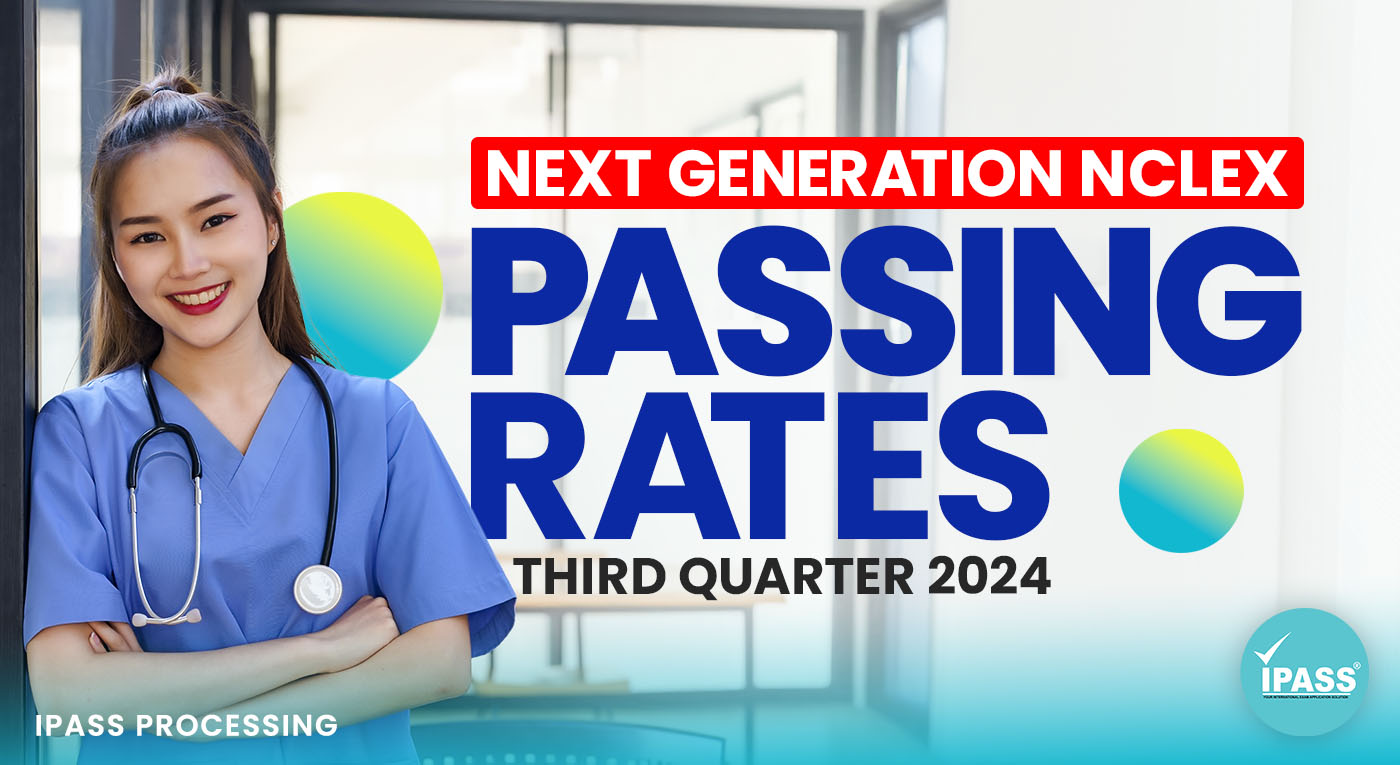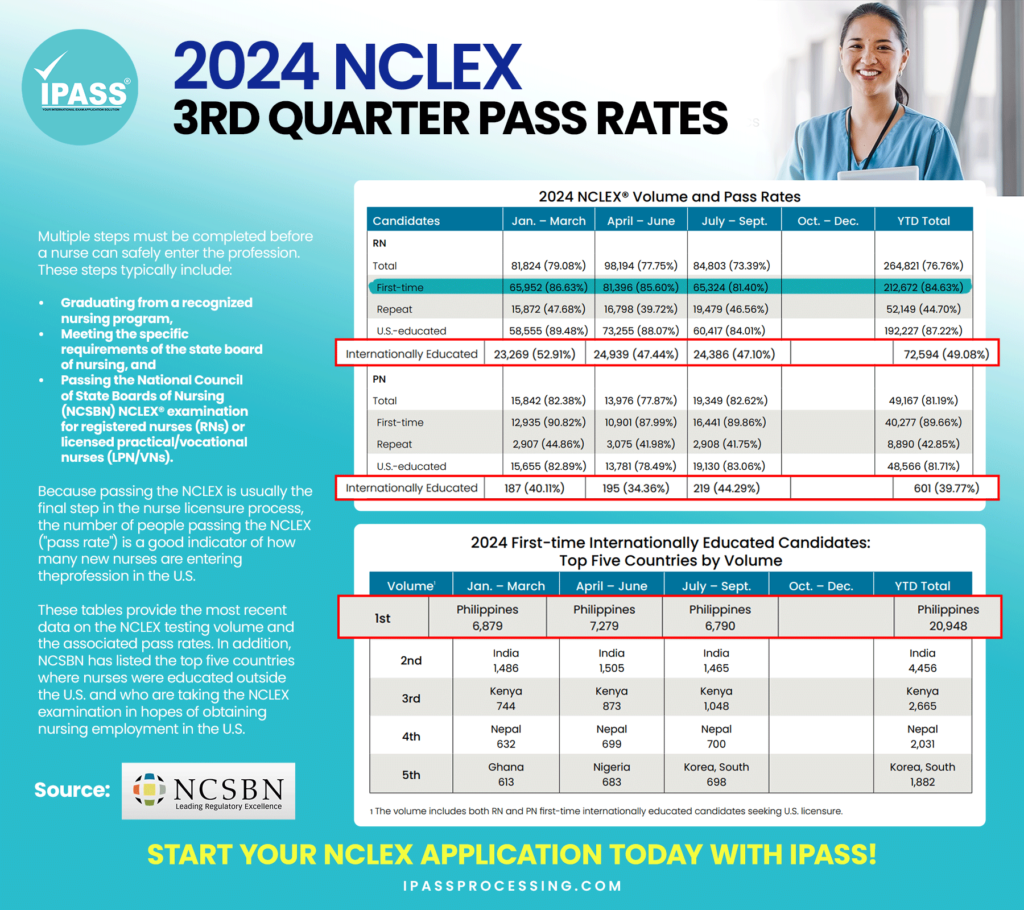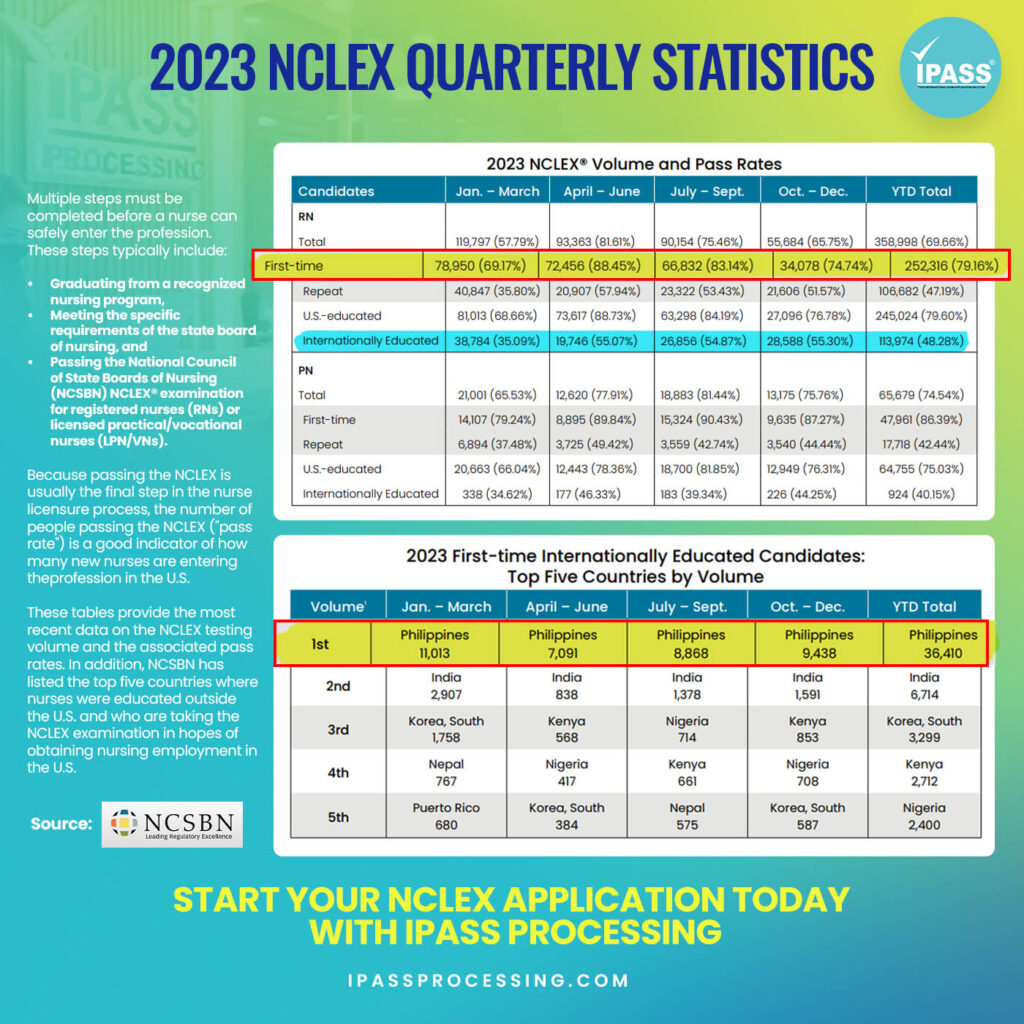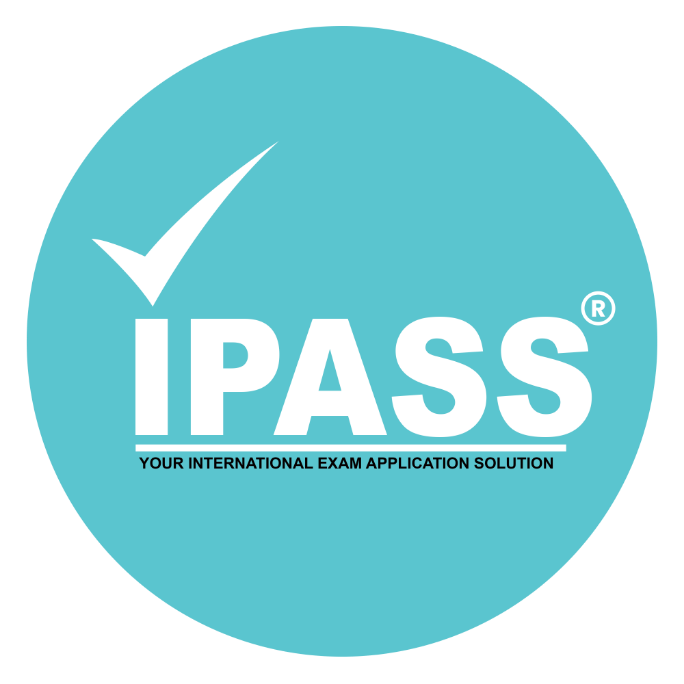Your cart is currently empty!

NCLEX Pass Rates 2024: The Q3 Statistics and Analysis
(Estimated Reading Time: 8 minutes)
The National Council Licensure Examination, or NCLEX, is a significant milestone for nursing graduates worldwide. Each year, thousands of candidates from various countries take this rigorous exam to earn their nursing licenses in the United States. The latest NCLEX Pass Rate 2024 – 3rd Quarter statistics have highlighted the volume, pass rates, and trends. This is for both US-educated and internationally-educated nurses (IENs).
Whether you’re a healthcare professional looking to stay informed about the NCLEX or an aspiring nurse, this article is for you. We’ll break down the essential figures from the 2024 NCLEX data report. Let’s dive deep into these statistics’ insights, trends, and implications.
What NCLEX Represents for Aspiring Nurses
The NCLEX exam is vital for anyone seeking to practice nursing in the United States. It serves as the final checkpoint before joining the healthcare workforce, ensuring all candidates meet stringent standards. In addition, the NCLEX exam validates a nurse’s ability to provide safe and effective patient care. Furthermore, this breakdown is for Registered Nurse (RN) and Practical Nurse (PN) licenses.
NCLEX Pass Rate 2024 3rd Quarter Data
The 2024 NCSBN NCLEX report provides a comprehensive view of candidates’ performance across different segments. Below, we’ll break down the key numbers for RN and PN candidates and details for first-time test-takers and repeaters.

Registered Nurse (RN) Exam Performance
For the RN exam, the statistics reveal exciting trends in volume and pass rates. As of the 3rd Quarter of 2024, 264,821 candidates attempted the NCLEX for RN, with an overall pass rate of 76.76%. For the 3rd Quarter alone, 84,803 candidates took the NCLEX with a passing rate of 73.39%. Here’s a closer look at how different groups performed:
- First-time Candidates
Most first-time test-takers demonstrate strong success rates in their NCLEX attempts. In NCLEX Pass Rates 2024 data, 215,872 first-time test-takers achieved an impressive 84.36% pass rate. Breaking down the third quarter results, 50,653 US-educated candidates took the NCLEX with a notably high passing rate of 89.19%. Meanwhile, 14,671 first-time internationally educated candidates achieved a passing rate of 54.50%.
- Repeat Candidates
The statistics show notably lower success rates for candidates retaking the NCLEX, with 52,249 repeat test-takers achieving a 44.07% pass rate. Looking specifically at the third quarter data, 9,764 U.S.-educated repeat candidates achieved a 57.14% passing rate. However, the 9,715 internationally educated repeat candidates recorded a 35.92% passing rate.
- US-educated vs. Internationally Educated
The pass rate also varies depending on where candidates received their nursing education. US-educated candidates achieved an 87.22% pass rate, while internationally-educated candidates had a lower pass rate of 49.08%.
Practical Nurse (PN) Exam Performance
The PN exam saw 41,987 candidates, with an 81.19% overall pass rate. Here’s how different groups performed:
- First-time Candidates
Most of these candidates passed on their first try, with a high pass rate of 88.35% among 32,817 first-time candidates.
- Repeat Candidates
Like the RN exam, repeat candidates in the PN category had a much lower pass rate of 42.83% from 8,892 candidates.
- US-educated vs. Internationally Educated
US-educated Practical Nursing candidates demonstrated a strong pass rate of 81.71%. In contrast, internationally educated PN candidates achieved a pass rate of 39.77%.
3rd Quarter NCLEX Internationally Educated Candidates
Internationally educated nurses face unique challenges in passing the NCLEX, often due to differences in educational training, language, and testing conditions. In 2024, here are the top five countries with the highest number of first-time candidates:
- Philippines – Leading the chart, 20,948 candidates from the Philippines took the NCLEX this year.
- India – Following closely with 4,456 candidates, India represents a significant portion of internationally educated nurses.
- Kenya – With 2,565 candidates attempting the exam, Kenya shows a growing presence in the US nursing workforce.
- Nepal – A total of 2,026 candidates from Nepal sought licensure this year.
- South Korea – Rounding out the top five, 1,822 candidates from South Korea took the NCLEX.
Key Observations and Insights from the NCLEX Pass Rates 2024
The 3rd quarter statistics for 2024 reveal several trends that aspiring nurses and educational institutions find helpful.
a. High Pass Rates Among US-educated Candidates
Candidates educated in the US tend to have higher pass rates compared to internationally educated candidates. This might reflect a closer alignment between US nursing education programs and the content covered on the NCLEX. Moreover, US nursing programs often have curriculums tailored to meet NCLEX standards, giving local candidates an edge.
b. Challenges for Repeat Test-takers
Another noteworthy insight is the low pass rate for repeat candidates. Those who do not pass on their first attempt often need help with subsequent attempts since their pass rates drop significantly. A solid study plan and effective exam preparation from the beginning are essential. This maximizes the chances of passing on the first attempt.
c. Low Pass Rates for Internationally Educated Nurses
The passing rate for internationally educated nurses (IENs) continues to decline. The 2024 NCLEX Pass Rates show that the passing rate for IENs is only 47.01%. This represents a decrease from the previous Quarter’s passing rate of 52.91%. Additionally, the overall passing rate for IENs as of the 3rd Quarter is 49.08%.
d. Strong Representation from the Philippines and India
The Philippines and India stand out among internationally educated candidates with the highest volumes of test-takers. These countries have long histories of supplying skilled nurses to the global market, particularly the United States.
South Korea, on the other hand, surpassed Ghana and Nigeria to have the 5th highest number of NCLEX takers in the 3rd Quarter of 2024. However, despite high candidate volumes, the pass rates for these groups often remain below those of their US-educated counterparts.
e. In Comparison with 2023 Pass Rates

- Persistent Gap
There continues to be a significant performance gap between US-educated and internationally-educated nursing candidates.
- Stable Performance
Overall pass rates remain relatively stable year-over-year with slight improvements.
- Geographic Diversity
The Philippines and India remain the primary sources of international nursing candidates.
- US Education Advantage
US-educated candidates consistently maintain higher pass rates, suggesting potential differences in educational preparation or testing familiarity for IENs.
Hopefully, we will see continued growth in international participation for the last Quarter of 2024. Improved pass rates across all candidate groups should follow as testing centers and preparation resources become more widely accessible worldwide.
How to Prepare for the NCLEX Exam
The 2024 NCLEX PASS Rates show that US-educated nurses achieve an 84.01% pass rate. In contrast, internationally educated nurses face a more challenging 47.10% success rate. This significant gap emphasizes that thorough NCLEX preparation isn’t just helpful—it’s essential for success. To maximize your chances of joining the successful first-time test takers, consider these proven preparation strategies:
1. Understand the Test Format
Familiarize yourself with the computerized adaptive testing (CAT) format of the NCLEX, as it adapts to each candidate’s responses.
2. Focus on Weak Areas
Identify your weaknesses early and focus on improving them. For example, internationally educated nurses may benefit from studying specific US healthcare practices and terminologies.
3. Take Practice Tests
Regularly taking practice tests simulates the real exam environment and helps you manage time and stress.
4. Seek Study Resources
Use reputable study resources that cover all NCLEX categories, such as pharmacology, health promotion, and care management.
5. Consider Review Classes
Enrolling in review courses tailored to the NCLEX can provide structure and expert guidance for test preparation.
How IPASS Can Help You Ace Your NCLEX on Your First Try!
For nurses worldwide, the NCLEX is not just a test but a gateway to career opportunities in the US healthcare industry. The exam opens doors for international nurses, enabling them to join a global network of healthcare providers. However, the NCLEX 2024 pass rates among internationally educated candidates highlight the need for adequate preparation and adaptation to US healthcare standards.
But don’t worry, we have great news for you! Aside from the IPASS Next Generation NCLEX Online Review and Mentoring Academy, we also offer a Booster Class! This is your final coaching solution that can help you strengthen your NCLEX preparation and pass your NCLEX exam.

The booster class includes:
- Eight (8) live Booster Classes with 2 hours duration each and unlimited access to the recording of live classes
- Two (2) live Trending Topics classes with 4 hours duration each and unlimited access to the recording of live classes
- Access to the whole IPASS NGN Question Bank
- One (1) Mock Examination
- Downloadable handouts
- 1240+ Next-Gen NCLEX Question Bank
- Technical support
The IPASS Online Review NGN Booster Class gives you 60 days of comprehensive NCLEX preparation from your registration date. Make your NCLEX success more affordable with our flexible payment plan: Start with PHP 4,000 today and settle the remaining PHP 4,000 in 30 days.
Ready to become an NCLEX passer? Take advantage of this opportunity to prepare for NCLEX with expert guidance! Contact IPASS Processing today!
Looking Forward to Preparing for Future Success
For aspiring nurses worldwide, the NCLEX represents more than just a licensure exam—it’s a gateway to joining a vital profession. As healthcare continues to evolve and the global demand for qualified nurses grows, success on the NCLEX opens doors to meaningful careers. These careers offer opportunities to make a difference in patients’ lives across the United States.
Whether you’re a nursing student in Manila, Mumbai, or Minneapolis, remember that your journey to becoming a licensed nurse in the US is challenging. But it is achievable. The NCLEX Pass Rates 2024 shows that with proper preparation, dedication, and the right resources, you can join the ranks of successful NCLEX passers. These successful NCLEX passers are shaping the future of healthcare, one patient at a time.
Ready to Pass the NCLEX? Get Expert Guidance! Schedule Your Free NCLEX Consultation with IPASS Processing Today
FAQs About the NCLEX 2024 Statistics
Q: Why is the pass rate lower for internationally educated candidates?
A: Differences in educational backgrounds, language, and familiarity with US healthcare standards can contribute to lower pass rates for international candidates. Moreover, not having enough preparation can also be a factor.
Q: How many times can someone take the NCLEX if they don’t pass on the first attempt?
A: Candidates can retake the NCLEX after a 45-day waiting period, with each state setting specific limits on the number of attempts allowed.
Q: What strategies can help first-time test-takers succeed on the NCLEX?
A: Consistent study, practice tests, and targeted review in weak areas can significantly improve the chances of passing on the first try.
Q: Are internationally educated nurses required to complete any extra steps before taking the NCLEX?
A: Yes, internationally educated nurses must meet additional requirements, including credential evaluation and possibly English language proficiency tests.
Q: How do the NCLEX pass rates impact nursing job opportunities in the US?
A: Higher NCLEX pass rates increase job opportunities, as passing the exam is required for licensure and employment as an RN or PN in the US.
Recommended Reads
- NCLEX Pass Rates 2024: Key Insights You Need to Know
- May 2025 PNLE Results: Top Schools & Topnotchers
- Ace the May 2025 PNLE: Final Week Preparation Tips
- Nursing Job Opportunities in the Philippines for USRNs
- AHPRA Registration 2025: Updated Pathways for IQRNs
Recommended Topics
- ASCPi (1)
- Australia (8)
- Canada (5)
- Exam Tips (28)
- General (120)
- IPASS Events (10)
- IPASS News (129)
- Middle East Nursing (17)
- NCLEX (64)
- New Zealand (3)
- NMBI Ireland (1)
- Online Review (13)
- PNLE Online Review (3)
- Tourist Visa (1)
- UKNMC (1)
- US Nursing (12)
- UWorld (1)
- VisaScreen (3)








Leave a Reply